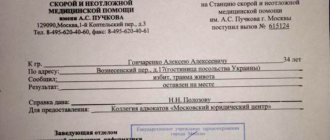Home / Situations
Back
Published: 03/09/2020
Reading time: 4 min
0
1137
In the films we see on TV, detainees are given the right to one phone call. But what is the reality like? Can a detainee demand from the police the right to a telephone call when he is detained? Or is this right not provided for by Russian legislation? Who can he call if he is given the opportunity to call? To answer this question, you need to rely on the provisions of the Federal Law of February 7, 2011 No. 3-FZ “On the Police”.
- What the law says
- Whom does the detainee have the right to call?
- Cases of granting the right to call
- Cases when the phone cannot be used
- Conversation restrictions
- Rules for exercising the right to call How the exercise of the right is formalized
- What if the right to make a telephone call is denied?
What the law says
Does a detainee have the right to a telephone call? When a police officer approaches a person on the street (for example, to check documents), this does not mean that he has been detained and charged. In this case, demanding a call is pointless and the person can call anyone without permission.
If a person is detained, then this indicates some restriction of the rights and freedoms of a citizen. But the right to make one telephone call remains: it is allowed to be made within three hours after the arrest.
Your requirement can be supported by reference to a legal norm. Based on Part 7 of Art. 14 of the Police Law, a detainee has the right to make a telephone call to loved ones . He can also ask the policeman to call his relatives to indicate where he (the detainee) is. Thus, a telephone call can be made by a detainee or a police officer, an investigator, or an interrogating officer (depending on the context of the arrest).
The right to make one telephone call in 2015 was also officially enshrined in the Criminal Procedure Code (CPC) in 2015 by Federal Law No. 437-FZ “On Amendments to the Criminal Procedure Code of the Russian Federation.” In Part 1 of Art. 96 of the Code of Criminal Procedure emphasizes that a person suspected of committing a crime can exercise the right to a telephone conversation within up to 3 hours after transporting him to the inquiry agency or to the investigator.
Based on legal norms, the right to call should be exercised immediately, but no later than the deadline for preparing the arrest report.
In addition to the right to a telephone call, the detainee should not forget about the right not to testify against himself and his family . He has the right to defense (including judicial protection) and the presumption of innocence.
He may also receive the right to legal assistance from the moment of detention and the right to refuse to give explanations and testimony without a lawyer.
Detention period
This measure is considered temporary. As a result of the investigation, it may turn out that the person is innocent. Therefore, the law allows citizens to be detained only for 48 hours. This is within the framework of criminal proceedings. And if a person is detained on an administrative matter, law enforcement officers can hold him at the police station for only 3 hours. They may be detained for 48 hours if:
- Identity cannot be established;
- an administrative offense has been committed for which administrative arrest may be provided.
And in order to keep a person accused of committing a criminal offense in a cell, he needs to be charged. Then the court will decide whether it is worth making a decision on the measure of restraint or whether it is necessary to let the person go home.
The price of each piece of paper
Every document drawn up when a citizen is detained is of great importance. And if the detainee’s lawyer notices that the protocol was drawn up in violation of procedural norms, he will pretend that he ignored the discovered mistake. In the protocols for recording an administrative offense, detention, search, various fields are provided that require mandatory completion. Police officers are unlikely to fill out these lines in a timely and competent manner.
Therefore, it is necessary to insist that the words of the detainee that are beneficial to him are included in the protocol, and the remaining empty spaces are filled in with dashes. In addition, you must request a copy of the document. Then, if the law enforcement officer subsequently changes (adds) the content of the protocol, it will be impossible to hide this fact. And falsifying a document is already an official crime.
The court considers, first of all, documents. Any violations committed during their preparation will help the citizen justify himself. But the judge has the right not to believe the words of the defendant. They will be judged to be untrustworthy. There is always more faith in the police, although it is also impossible to recognize them as people who are not personally interested in a specific turn of events.
Whom does the detainee have the right to call?
The legislation does not clearly indicate the list of persons who can be called as part of the exercise of their rights.
The right to a telephone call is guaranteed to a detainee for a reason, but so that he can notify his loved ones about his whereabouts and the fact of detention. He can call his wife, children, parents and other close people and relatives.
If you were unable to call your loved ones, you can report the incident to third parties.
How to protect yourself from arbitrariness
There are several ways to protect yourself.
- You need to use the assistance of a highly qualified lawyer. You should not answer any questions without his participation.
- In case of violation of rights, the detainee should call the prosecutor on duty.
- There is an internal security service of the Ministry of Internal Affairs.
Phone numbers of law enforcement agencies are available on the information stand. However, you need to understand that neither the interrogator nor the investigator will help the detained citizen in protecting his rights. Most likely, the lawyer or relatives will have to raise the alarm.
A citizen could intentionally or unwittingly break the law. However, this does not mean that law enforcement officers are also allowed to violate rules and regulations. After all, then they themselves will become criminals, only hiding behind the broad back of the state.
For a lawyer, his client is always right, even if he has committed a crime before the state. Whether a person is truly guilty is for the judge to decide. And the task of a lawyer is to fully assist in the acquittal of his employer. A hired lawyer must not allow the rights of a detained client to be violated. He is also obliged to turn any mistakes by law enforcement officials to the benefit of the citizen. Then his client will be acquitted in court.
Cases when the phone cannot be used
The right to a telephone call is guaranteed by default to all detainees, unless otherwise established by the Code of Criminal Procedure. But the law provides a list of persons who are not entitled to such a right (based on Part 11 of Article 14 of the Federal Law “On the Police”). This:
- Persons who are detained as a result of escaping from custody or a psychiatric institution.
- Persons who evade serving their assigned administrative punishment in the form of administrative arrest.
- Persons who evade serving a criminal sentence, from receiving an order to be sent to the place of serving the sentence, or who fail to arrive at such a place within the established time frame.
- Persons who are wanted.
- Persons evading the implementation of intended educational measures.
- Persons evading admission to specialized psychiatric treatment institutions or hiding from forced hospitalization.
In all other cases, the citizen has the right to make a telephone call.
The right of a detainee to have a telephone conversation
Lawyer Antonov A.P.
The third part of Art. 46 of the Code of Criminal Procedure of the Russian Federation is devoted to two duties of the investigator (interrogator, etc.). In particular, it sets out two requirements:
1) provide a suspect detained “in accordance with Articles 91 and 92” of the Code of Criminal Procedure of the Russian Federation, “the right to one telephone conversation in Russian in the presence of an interrogating officer, investigator for the purpose of notifying close relatives, relatives or close persons about his detention and location”;
2) “the inquiry officer, the investigator must fulfill the duties of notifying the arrest in accordance with Article 96” of the Code of Criminal Procedure of the Russian Federation.
According to clause 3, part 1, art. 46 of the Code of Criminal Procedure of the Russian Federation, a suspect is also a person to whom a preventive measure has been applied before charges are brought in accordance with Art. 100 Code of Criminal Procedure of the Russian Federation. This preventive measure may be detention. A suspect detained in pursuance of the appropriate preventive measure chosen for him (custodial detention) is literally not given the right to one telephone conversation in order to notify anyone of his detention and location.
A suspect who is not in custody and is placed by a court decision in a medical organization providing medical care in an inpatient setting, or in a medical organization providing psychiatric care in an inpatient setting, for the purpose of conducting a forensic or forensic psychiatric examination, is also deprived of this opportunity.
Moreover, the suspect who was detained after he was put on the wanted list (Part 3 of Article 210 of the Code of Criminal Procedure of the Russian Federation) does not have the right in question.
There is no right to one telephone conversation for the purpose of notifying certain persons about the arrest and the location of the accused. Thus, the accused who, for example, has committed a new crime and is detained in accordance with Art. Art. 91 and 92 of the Code of Criminal Procedure of the Russian Federation at the place of its commission, when this episode of criminal activity is being investigated within the framework of the same criminal case (where he is an accused, not a suspect).
Of course, it does not have such an opportunity either:
- a convicted person who has escaped in order to evade serving a sentence in the form of a fine, compulsory labor, correctional labor or restriction of freedom, or sentenced to forced labor who has evaded receiving an order provided for in Part 2 of Art. 60.2 of the Penal Code of the Russian Federation, or who did not arrive at the place of serving the sentence within the period established in the order, who was detained to take him into custody until consideration of the issue of replacing the punishment with a more severe one (forced labor - imprisonment);
- a person sentenced to imprisonment and serving a sentence in a colony-settlement, detained for his detention (sentence to a colony-settlement under escort or a change in the type of correctional institution assigned to him by a court verdict) in connection with his evasion of receiving an order to be sent to place of serving the sentence or failure to arrive at the place of serving the sentence within the period established in the order, but not more than 30 days (part 4.1 of article 396, clause 3 of part 1 of article 399 of the Code of Criminal Procedure of the Russian Federation).
Thus, clause 2, part 1, art. 46 of the Code of Criminal Procedure of the Russian Federation does not apply to cases of detention of persons who were already given the status of a suspect at the time of their detention: in connection with the initiation of a criminal case against a person on the grounds and in the manner established by Chapter 20 of the Code of Criminal Procedure of the Russian Federation (Clause 1, Part 1, Art. 46 of the Code of Criminal Procedure of the Russian Federation), applying a preventive measure to him before arrest (clause 3 of Part 1 of Article 46 of the Code of Criminal Procedure of the Russian Federation) or notification of suspicion of committing a crime in the manner established by Art. 223.1 of the Code of Criminal Procedure of the Russian Federation (clause 4, part 1, article 46 of the Code of Criminal Procedure of the Russian Federation). Let us repeat, the right discussed in Part 3 of Art. 46 of the Code of Criminal Procedure of the Russian Federation, is provided to the suspect only “in the case provided for” in paragraph 2 of part 1 of Art. 46 of the Code of Criminal Procedure of the Russian Federation, and not in the event of his arrest “in accordance with Articles 91 and 92” of the Code of Criminal Procedure of the Russian Federation.
So, the right to one telephone conversation in Russian in the presence of an investigator (inquiry officer, etc.) in order to notify close relatives, relatives or close persons about his detention and location, in our opinion, should be provided to each and every suspect detained “in in accordance with Articles 91 and 92 of the Code of Criminal Procedure of the Russian Federation, as well as a person brought to the preliminary investigation body after his actual detention, in the period of time between his delivery to the investigator (to the inquiry body) until he is given the status of a suspect.
An accused who has committed a new crime and was detained in connection with this in accordance with Art. Art. 91 and 92 of the Code of Criminal Procedure of the Russian Federation. Detention in execution of others, in addition to those provided for in Art. Art. 91 and 92 of the Code of Criminal Procedure of the Russian Federation, procedural decisions, no matter who, in connection with what and in relation to whom they were made, without a doubt, does not yet provide the detainee, including the suspect, with the right to one telephone conversation in order to notify what - persons about their arrest and location.
The telephone conversation referred to in Part 3 of Art. 46 of the Code of Criminal Procedure of the Russian Federation, must necessarily take place through a telephone connection - interaction established as a result of a call between means of communication, allowing the subscriber and (or) user of telephone services to transmit and (or) receive voice and (or) non-voice information (clause 2 of the Rules for the provision of services telephone connection).
In Part 3 of Art. 46, part 1 art. 96 of the Code of Criminal Procedure of the Russian Federation refers to the presence of an inquiry officer or investigator during a conversation. They are also entrusted with the obligation to notify about the fact of what was done in accordance with Art. Art. 91 and 92 of the Code of Criminal Procedure of the Russian Federation detaining a person on suspicion of committing a crime by his close relatives, relatives or close persons. The same list is given in the legal literature. Moreover, sometimes he is limited only to the figure of the investigator. Before commenting on whether this list is exhaustive, let us define those named in Part 3 of Art. 46 of the Code of Criminal Procedure of the Russian Federation to the concepts of “investigator”, “investigator”.
Sincerely, lawyer Anatoly Antonov, managing partner of the law firm Antonov and Partners.
Still have questions for your lawyer?
Ask them right now here, or call us by phone in Moscow +7 (499) 288-34-32 or in Samara +7 (846) 212-99-71 (24 hours a day), or come to our office for a consultation (by pre-registration)!
Conversation restrictions
Investigators have the right to introduce restrictions on the right to make a telephone call. This opportunity is guaranteed to them by Part 4 of Art. 96 Code of Criminal Procedure. This decision is justified by the need to preserve the secrecy of the fact of detention in the interests of the investigation. To restrict the right to make a call, there must be a reasoned resolution of the inquiry officer or investigator with the consent of the prosecutor.
The introduction of restrictions is not permitted if the suspect is a minor.
In any case, the legal representatives of the minor are notified of the incident as soon as possible.
Powers of detention
Carrying out administrative detention is a power that, in accordance with Art. 27.3 of the Code of Administrative Offenses of the Russian Federation, employees are entitled to:
- border service,
- police,
- criminal executive service,
- customs authorities,
- military automobile inspection,
- FSKN.
Note! Only participants in official counter-terrorism operations have the right to detain citizens.
The officer carrying out the detention is obliged to inform the citizen about the purpose of the measure and notify his relatives.
Rules for exercising the right to call
The exercise of the right to make a telephone call has the following features:
- The detainee is entitled to one telephone call.
- The conversation must take place in Russian.
- The conversation takes place in the presence of an investigator or interrogator.
- The purpose of the conversation is to notify about the fact of detention and the location of the caller. Although the detainee should be guided by the stated purpose of the call, he can also ask to find a lawyer to ensure his defense.
How the exercise of rights is formalized
Based on the results of the call, the operational duty officer makes a note in the arrest report. If the detainee refuses a telephone call or if he has physical or mental characteristics that do not allow him to independently exercise this right, a corresponding note is also made in the protocol.
If the detainee refuses or is unable to make a telephone call, then the investigator or interrogating officer must notify relatives.
If a lawyer is detained, the regional chamber of lawyers of which he is a member is notified of this fact within 12 hours from the moment of detention.
Responsibilities of Law Enforcement Officers
Human rights when detained by police include notifying relatives, an employer, or a lawyer of the arrest. At the request of the detained citizen, these persons are notified as soon as possible.
Responsibilities of a police officer when detaining a citizen:
- Introduce yourself . He is obliged to give the full name and inform the detainee of his position.
- Show ID . The document is shown open with a photograph and basic information.
- Explanation of the reason for the detention . The basis for applying the procedural measure is indicated.
- Clarification of rights . The police officer explains to the detained citizen his rights and obligations (based on Article 27.3 of the Code of Administrative Offenses of the Russian Federation).
The absence of one of the above conditions is the basis for making appropriate notes in the administrative detention protocol.
About the arrest report
A protocol on administrative detention is drawn up containing signatures of the official and the detained citizen. If the latter refuses to sign, a corresponding entry is made in the document.
Attention! The detained person has the right to request a copy of the completed detention protocol for detailed review. Also, a detained citizen has the right to demand notification of his detention to his employer, relative or lawyer.
Required contents of the document:
- date and place of its registration,
- Full name and position of the person who made the arrest,
- information about the detained citizen,
- time and place of detention,
- the reason for applying the measure.
Behavior during arrest
The main rule is not to be rude to law enforcement officers and not to use physical force against them. Try to remain calm, even if you disagree with the basis for the detention.
Remember!
Resisting arrest can turn against you - the law defines administrative and criminal liability for this.
Do not attempt to hide from police officers, do not sign an arrest report or other documents without studying them or without a lawyer. Do not confirm information that you do not know or have not done.
Write down the names of law enforcement officers and their positions. If you are left in a police station, do not touch objects with your hands unless they are your own belongings.
The lawyer will tell you what rights a citizen has during arrest in the video below:
Definition of detention and its reasons
Detention is the deliberate deprivation of a person's liberty for a short period of time if the detainee is suspected of committing a crime. This measure can be applied at an early stage of the investigation of a criminal or administrative case.
Detention is regulated by the Code of Criminal Procedure of the Russian Federation and is an emergency method that can only be used in conditions where a specific person is suspected of committing a crime by investigative authorities, and also if, according to the pre-trial investigation, the detention of the suspect will protect society and prevent possible offenses. However, detention can only be done on certain documented grounds. So, in Art. 91 of the Code of Criminal Procedure of the Russian Federation reflected the following reasons for detention:
the citizen was caught red-handed while committing an offense;- in the presence of clear testimony that would prove that a particular citizen is the main person involved in the criminal act;
- if there are traces of a crime on the personal belongings of the suspect, on his body or at the place of residence, and the suspect himself cannot clearly explain their appearance;
- in the presence of any data that directly and thoroughly indicate the guilt of the suspect.
- Detention is necessary to prevent further offenses.
Also, based on Art. 38 of the Criminal Code of the Russian Federation, during detention, it is permissible to cause harm in certain conditions when it is not possible to avoid this. However, causing harm may be considered as abuse of power in cases where the suspect did not pose an obvious danger to the life of society, as well as when the suspect was intentionally and unreasonably inflicted with bodily harm. Such behavior by police authorities is criminally punishable.
Important fact
In conditions where a military officer or an employee of the Ministry of Internal Affairs is suspected of committing an offense, it is necessary to notify the immediate commander or command department of the detainee.
During administrative detention
General rights during administrative detention:
- Know on what grounds the deprivation of his freedom is carried out.
- The right to call upon arrest.
- Use qualified legal assistance from the moment of deprivation of liberty.
- Appeal the chosen procedural measure to the prosecutor's office.
- Demand an investigation into the legality of the detention, etc.
The duration of administrative detention does not exceed 3 hours. In exceptional cases, the period is extended to 48 hours. It is calculated from the moment the person is brought to the place of short-term deprivation of liberty.







